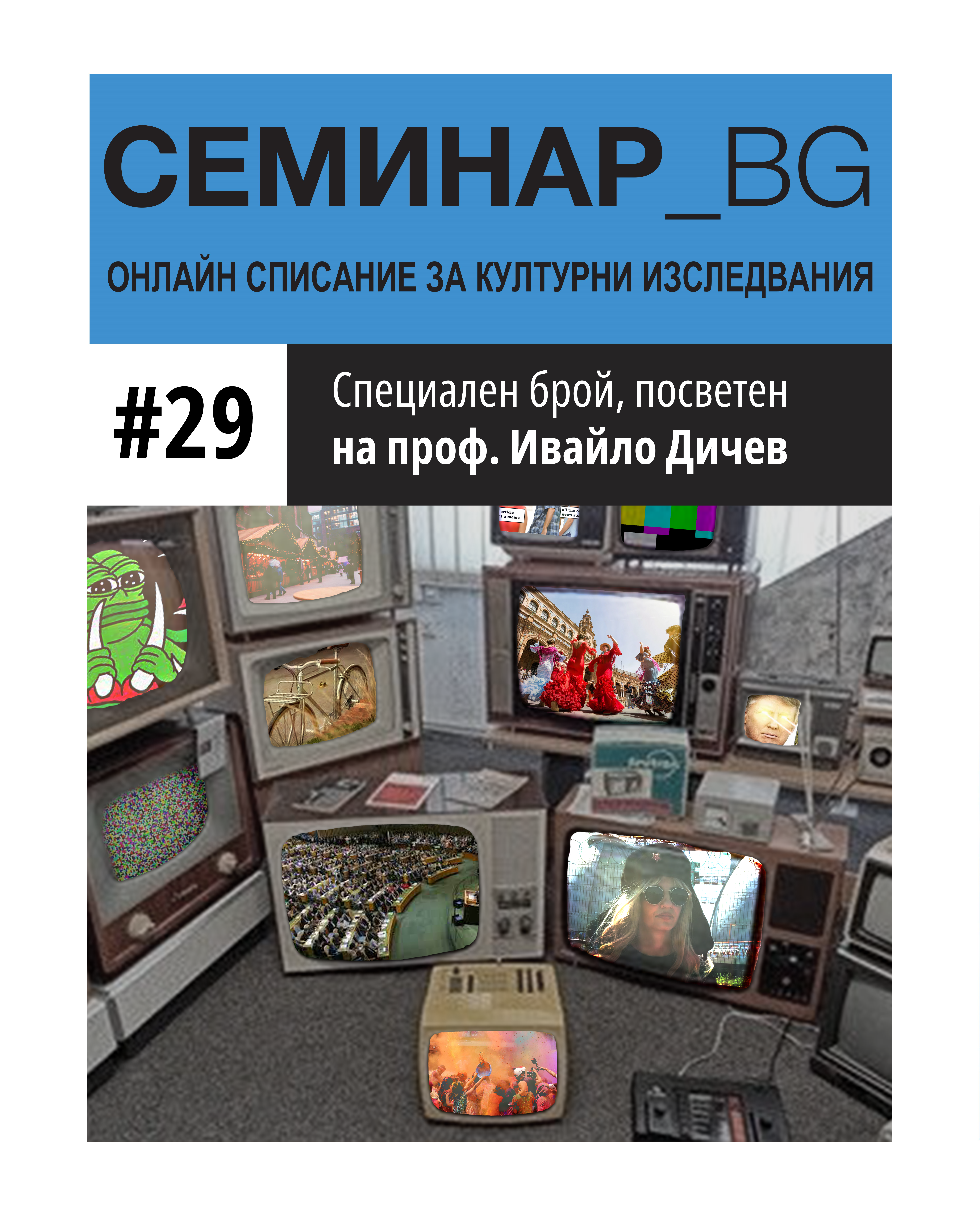Виртуална (само)екзотизация на източноевропейската идентичност
DOI :
https://doi.org/10.60054/SBG.2025.29.193-213Ключови думи :
мемове, славяни, екзотизация, периферализация, Източна ЕвропаРезюме
Настоящата студия се позиционира в полето на изследванията на мем културата, като предлага критически прочит на славянските репрезентации в социалните мрежи на дигиталния бранд Squatting Slavs in Tracksuits. Анализът се фокусира върху няколко взаимосвързани аспекта: процесите на метафоризиране и екзотизиране на славянската идентичност, нейното обвързване с (пост)социалистическото източноевропейско пространство и имплицитната ѝ регионална периферализация. Изследването е разгърнато на три нива: проследяват се културно-историческите предпоставки, формирали представите за славянския свят, реконструира се съвременният му облик въз основа на мобилизираните в мемовете сюжети и визуални елементи и се прави опит за контекстуализиране на установените тенденции в по-широките рамки на социалната и политическата критика.
Библиография
Алексиева, Анна. 2013. „Дисциплината „славистика“ – утопии и маргинализации“. In: Gazetić, Edisa and Kos, Dženan (eds.) Zbornik radova. Prva međunarodna znanstvena konferencija u oblasti kniževnosti i jezika. Travnik: Univerzitet Edukaciјski fakultet, 295-318.
Бергсон, Анри. 1996. Смехът (Есе относно значението на комичното), прев. Т. Минева. София: Издателство „Сонм“.
Дичев, Ивайло. 2002. От принадлежност към идентичност. Политики на образа. София: Лик.
Кьосев, Александър. 2008. „Микрометодология: отношението „център-периферия“ като методологически проблем на славистичната компаративистика“. В: Индигото на Гьоте. София: Фигура, 244-260.
Улф, Лари. 2004. Изобретяването на Източна Европа. Картата на цивилизацията в съзнанието на Просвещението, прев. Р. Панайотова. София: Издателство „Кралица Маб“.
Хегел, Георг В. Х. 1995. Философия на историята. Том II: Духът на Европа. София: Евразия.
Bourdieu, Pierre. 1998. La domination masculine. Paris: Seuil.
Buchowski, Michal. 2006. “The Specter of Orientalism in Europe: From Exotic Other to Stigmatized Brother”. Anthropological Quarterly, 79 (3), 463-482.
Daniel, Ondřej. 2019. “Hardbass: Intersectionality, Music, Social Media and the Far-Right on the European Periphery”. In: Appen, Ralf von and Dunkel, Mario (eds.) (Dis-)Orienting Sounds: Machtkritische Perspektiven auf populäre Musik. Bielefeld: Transcript-Verlag, 153-166.
Daniel, Ondřej. 2021. “Vodka, Beer, Papirosy”. Eastern European Working‐class Cultures Mimicry in Contemporary Hardbass”. In: Kölbl, Marko and Trümpi, Fritz (eds.) Music and Democracy: Participatory Approaches, Wien: mdwPress.
Đorđević, Vladimir, Suslov, Mikhail, Čejka, Marek, Mocek, Ondřej and Hrabálek, Martin. 2023. “Revisiting Pan-Slavism in the Contemporary Perspective”. Nationalities Papers, 51(1), 3-13.
Götz, Еlias and Staun, Jørgen. 2022. “Why Russia attacked Ukraine: Strategic culture and radicalized narratives”. Contemporary Security Policy, 43(3), 482-497 (посетено на 8.02.2024 г.).
Huntington, Samuel P. 1993. “The Clash of Civilizations?”. Foreign Affairs, 72(3), 22-49.
Kalmar, Ivan. 2022. White But Not Quite. Central Europe’s Illiberal Revolt. Bristol: Bristol University Press.
Kalmar, Ivan. 2023. “Race, Racialisation, and the East of the European Union: an Introduction”. Journal of Ethnic and Migration Studies, 49(6), 1465-1480.
Lewicki, Aleksanda. 2023. “East–West Inequalities and the Ambiguous Racialisation of ‘Eastern Europeans”. Journal of Ethnic and Migration Studies, 49(6), 1481-1499.
Loeb, Eli. 2020. Gopniki: Peripheral Masculinity in Post-Soviet Russia [Pomona Senior Theses. 238] (последно посетен на 26.10.2024 г.).
Mälksoo, Maria. 2010. The Politics of Becoming European. A Study of Polish and Baltic Post-Cold War Security Imaginaries. London: Routledge.
Mühle, Eduard. 2018. “Inventing Slavic Unity or the Political Use of a Romantic Concept. The Case of Mikhail P. Pogodin and Joachim Lelewel”. Historia Slavorum Occidentis, 4(19), 94-118.
Petrungaro, Stefano. 2023. “Pan-Slavism, its interpretative ambiguities and conflicting practices”. In: Hemstad, Ruth & Stadius, Peter (eds.) Nordic Experiences in Pan-Nationalisms. A Reappraisal and Comparison, 1840–1940. London & New York: Routledge, 260-276.
Safuta, Anna. 2018. “Fifty Shades of White: Eastern Europeans’ ‘Peripheral Whiteness’ in the Context of Domestic Services Provided by Migrant Women”. Tijdschrift voor Genderstudies, 21(3), 217-231.
Sojka, Aleksanda. 2020. “Liminal Europeanness: Whiteness, East-West Mobilities, and European Citizenship”. In: Kulawik, Teresa and Kravchenko, Zhanna (eds.) Borderlands in European Gender Studies Beyond the East–West Frontier. New York: Routledge, 191-210.
Suslov, Mikhail. 2012. “Geographical Metanarratives in Russia and the European East: Contemporary Pan-Slavism”. Eurasian Geography and Economics, 53(5), 575-595.
Ţichindeleanu, Ovidiu. 2010. “Where Are We, When We Think in Eastern Europe?”. In: Ćurlin, Ivet, Dević, Ana, Ilić, Nataša, Sabolović, Sabina, Hegyi, Dóra, László, Zsuzsa, Ziółkowska, Magdalena and Słoboda, Katarzyna (eds.) Art Always Has Its Consequences, Zagreb: WHW, 86-91.
Todorova, Maria. 2009. Imagining the Balkans (Updated Edition). Oxford: Oxford University Press.
Veczán, Zoltan. 2023. “Depiction of the Balkans on Internet Memes from 9GAG”. KOME: An International Journal of Pure Communication Inquiry, 11(1), 61-94.
Файлове за сваляне
Публикуван
Как да цитирате
Брой
Секция
Лиценз

Публикация с Creative Commons Attribution-NonCommercial-NoDerivatives 4.0 International License.

